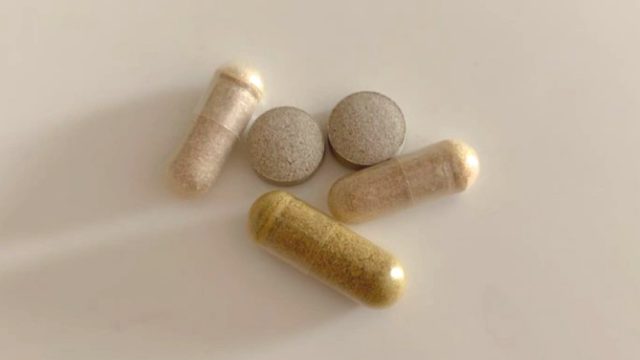How Menopause Can Impact Sexual Health
STD or vaginal atrophy? Dr. Mary Claire Haver explains.

At some point in their lives, up to 75% of women will experience painful intercourse, according to the American College of Obstetricians and Gynecologists. For many of us who can relate, the culprit is a loss of hormones during menopause, which can trigger a host of symptoms. “[Women] are not even discussing it – whether they don’t know they can be treated, they just think it’s normal, or they’ve tried to talk about it, and they’re not getting the help that they need,” says Dr. Mary Claire Haver, a board-certified OB/GYN and menopause specialist who has built up a 2M+ following on TikTok for her menopause advice.
Yet the problem doesn’t just lie in the fact that we often don’t feel comfortable discussing sexual health but also in the reality that many medical practitioners aren’t equipped with the knowledge to diagnose menopause-related issues, including when it comes to our sex lives.
When RESPIN founder Halle Berry began experiencing extreme pain after sex, she was misdiagnosed. The actual cause of what she described as feeling like “razor blades in her vagina?” Vaginal atrophy, or the thinning and drying of the vaginal lining – just one of the many ways menopause impacts our bodies. The revelation was part of a broader dialogue surrounding taboo topics in women’s health between Berry and First Lady Jill Biden that took place earlier this year during the annual A Day of Unreasonable Conversation event held in Los Angeles.
Filling the Knowledge Gap
“Until we train the trainers and change the training programs to include realistic menopause care, we’re probably a generation away from being able to confidently walk into your healthcare provider’s office and have a reasonable discussion about your menopause,” says Dr. Haver, who can relate to her menopausal patients all too well. Her own path toward becoming an expert in the field began during her personal hormonal transition when she quickly realized the disconnect between what she had learned in med school and what she actually needed to know. What followed was her menopause-focused nutrition program, The Galveston Diet, and bestselling book by the same name.
Now, as the author of the newly released “The New Menopause: Navigating Your Path Through Hormonal Change with Purpose, Power, and Facts,” Dr. Haver continues to fill that knowledge gap, giving readers the facts they need to feel empowered and understand the changes their bodies are going through, from sleep to sex.
Menopause, Libido, and Vaginal Atrophy
Menopause can impact life between the sheets in a number of ways, starting with our sex drive. When our bodies stop producing reproductive hormones in perimenopause, we may begin to feel the effects on our libido, which, for women, is typically driven by both psychological and situational factors. Whereas men’s sexual desire is usually 85% spontaneous and 15% reactive, women are the opposite – for lack of better terms, a “basic mismatch,” as Dr. Haver calls it.
This only gets more dramatic as we age, especially given that, as women continue to age, we often feel judged by society or are prone to drawing comparisons between the younger and current versions of ourselves. As Dr. Haver points out, a decrease in hormones, especially testosterone, only further complicates things, affecting the brain’s reactivity and desire center.
Estrogen and testosterone loss in the genital area can also shrink the size of the clitoris, resulting in loss of sensitivity, as well as elasticity, mucus production, and the ability to tolerate friction in the area. So, if it’s taken you longer to orgasm or get aroused lately, well, you may have menopause to thank for that, too.
And while we’re on the topic of erogenous zones, vaginal dryness (also known as vaginal atrophy or atrophic vaginitis), which shows up as a loss of elasticity and lubrication, also causes a number of issues, from more frequent yeast infections to feelings of burning and dryness. As your vaginal tissue becomes less healthy and resilient, it can break and crack more easily, making you more likely to bleed and have an exchange of fluid both ways and leaving you more susceptible to STDs. Not surprisingly, studies show transmission rates of STDs and STIs for postmenopausal women are up, partly due to their increased susceptibility.
The decrease in estrogen during menopause also changes the microbiome in the vagina and the bladder and weakens the muscles of the urethra, making women more vulnerable to UTIs. A 2019 National Institute of Health study confirmed that half of postmenopausal females develop recurrent UTIs. That hormonal drop can also lead to pelvic floor dysfunction, causing those muscles to either loosen or spasm, creating pain both during and after sex.
The Power of Local and Systemic HRTs
Fact: Menopause is going to happen to all of us. What we can change, though, is how we navigate it. When it comes to sexual health, there are plenty of ways to relieve symptoms. If you’re addressing physical symptoms, localized hormone replacement therapies (HRTs), which range from creams to pills, serums, rings, and suppositories, can offer relief and restore the health of the vaginal tissue. (If you’ve had breast cancer, discuss the potential risks of some of these options with your healthcare provider.) While it takes several weeks for these treatments to kick in, they will eventually offer relief for symptoms like vaginal atrophy – just be sure to use them consistently. “Replacing hormones in that area can be really, really powerful,” says Dr. Haver.
When it comes to treating recurring UTIs, those HRTs (not antibiotics!) are also her menopausal patients’ best bet, says Dr. Haver. “If we restore the natural health and tissue and thickness and elasticity and mucus, the ability to fight off the bacteria that just live in the area, then you’re less likely to get a UTI.”
Systemic HRT (also known as whole body HRT) is used to address more complicated issues such as libido (after issues such as relationship disorders and other causes of pain have been ruled out). Currently, the FDA has approved two such medications for premenopausal women, Addyi and Vyleesi (both of which are often denied by insurance, FYI). For women in menopause or postmenopause, testosterone therapy is an effective go-to, says Dr. Haver. Since there’s no FDA-approved testosterone option, doctors will write patients made-to-order prescriptions that can be filled at a compounding pharmacy or try to order an FDA option approved for men as an alternative.
Lubricants to the Rescue
Lubricants may not be a cure-all for painful sex during menopause (and as vaginal atrophy progresses, they won’t do the trick without HRT), but that doesn’t mean they don’t have a place in the bedroom to ease things along. The North American Menopause Society suggests water-based versus oil-based ones, applied either to the vulva or penis before intercourse, as they are less likely to cause irritation. “I think every woman who’s on her menopause journey should use a lubricant,” says Dr. Haver. “It just makes everything better.”
A Growing Awareness
Tapping into that growing awareness and thirst for more information, Dr. Haver debuted the Mary Claire Wellness Clinic in Houston in 2021 while writing her second book. Dedicated to menopausal patients, the clinic’s success speaks to our appetite for more information and options, especially as more and more of us realize that pain, sex, and never-ending UTIs don’t have to go hand in hand when menopause kicks in.
“The clinic’s been insanely successful, and I’m going to start training other providers on how to do menopause care,” says Dr. Haver. “But it really just has been this continuous evolution of realizing there’s more out there,” she says of her patients’ willingness to embrace this phase of life and her desire to support them while they do so. “I’m not willing to accept the status quo.”



